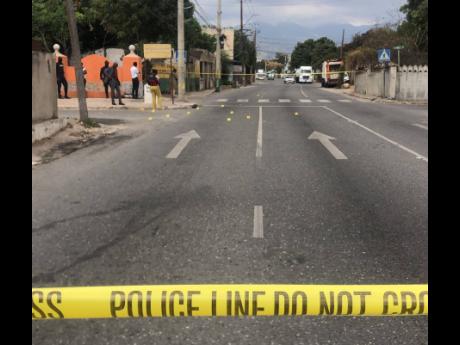Experts: Murderous thugs irredeemable
... Say lengthy prison sentences key in fighting nation’s violent culture
THE EXPLETIVES were on the cusp of Suzan Jones’* lips after the motorcycle with two men aboard swerved in front of her, forcing her to jam hard on her car brakes on the busy Chancery Street in Meadowbrook, St Andrew, on Tuesday morning. She was...
THE EXPLETIVES were on the cusp of Suzan Jones’* lips after the motorcycle with two men aboard swerved in front of her, forcing her to jam hard on her car brakes on the busy Chancery Street in Meadowbrook, St Andrew, on Tuesday morning.
She was about to let fly a couple choice words when the pillion rider, clutching a gun, alighted before her in pursuit of his target.
One shot.
Two shots.
Then Jones’ anger switched to crippling fear as she cowered low in her car.
In front of her, the pillion rider chased his victim, the latter clutching clumsily at the waist of his pants as he ran. He didn’t get far before collapsing or before the getaway rider scooped up the gunman from the scene.
Dozens of people standing at nearby bus stops witnessed the incident. That doesn’t matter, however, explained Professor Anthony Clayton. These are hardened outlaws, brazen, and undeterred by whatever gun laws or courts of the land.
“These are hardcore, professionals. We can’t hope to reintegrate these people. There is very little chance to reintegrate them back into society,” charged Clayton, reflecting on a string of brazen daylight killings and shoot-outs by thugs in recent months.
“The surprising thing is that we now have the new legislation with regard to guns and homicides, but it does not appear to be having quite the deterrence effects that we hoped,” continued the national security expert.
“What the new legislation does, however, is enable us to get these guys off the street with very lengthy prison sentences. That is the only way we can deal with them,” said Clayton, speaking to the boldness of criminals willing to challenge armed security guards and murder victims in broad daylight.
Firearm Act
Last September, Parliament passed the Firearm (Prohibition, Restriction and Regulation) Act, 2022, which Police Commissioner Antony Anderson touted as a game changer in Jamaica’s crime fight.
Still, recent gun murders in the Corporate Area and St Catherine go unabated: back-to-back early morning attacks on two security teams; the afternoon murders of two men in 100 Lane off Red Hills Road; and Tuesday evening’s brazen murder at a gas station at the intersection of Waltham Park and Molynes roads in St Andrew, to name a few.
“We have a culture of violence in this society,” argued political psychologist Dr Christopher Charles. “So when a man says that he is a badman, he doesn’t care. He doesn’t care what will happen.
“There are cases where men take out their knives to kill others in front of the police, and the police, rather than arrest the person, prevents the killing and allows the person to go away,” Charles asserted. “So these men do not care who is around when they attack.”
Charles said it is foolish for Jamaicans to believe that the words of politicians, law enforcement, or particular legislation will drive fear into criminals. Neither does he think there is any hope of driving the fear of God into hoodlums, as “they don’t believe in God”.
He said that crime must be treated as a public-health issue, tackling violence in homes, schools, communities, and the wider society. He suggests establishing stationary police posts and regular patrols in hotspots, using military intelligence to track down criminals, and then applying the anti-gang law.
As the authorities and the security forces continue their battle, however, ordinary Jamaicans like Suzan Jones have to deal with the trauma of exposure to murders.
“From Tuesday morning until now, it just keeps playing over and over in my head. It really shakes me up,” she said. “It is the first time I am seeing anything like this in my 40-odd years. I can’t believe this is Jamaica.”
Police statistics reveal that between January 1 and March 25, there were 232 shootings across the island. This is 39 fewer than over the corresponding period in 2022. St Andrew South led the island’s 19 police divisions with 28 shootings, followed by Westmoreland (27) and St James (23). Portland saw the fewest shootings over the period with one incident.
Some 280 people had been murdered across the island up to March 25.
*Name changed.

